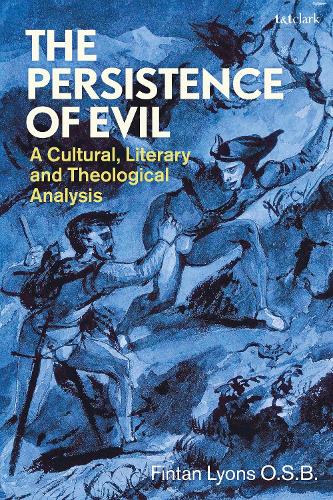
The Persistence of Evil: A Cultural, Literary and Theological Analysis
(Hardback)
Available Formats
Publishing Details
The Persistence of Evil: A Cultural, Literary and Theological Analysis
By (Author) Revd Fintan Lyons O.S.B.
Bloomsbury Publishing PLC
T.& T.Clark Ltd
16th November 2023
United Kingdom
Classifications
Tertiary Education
Non Fiction
809.93353
Physical Properties
Hardback
384
Width 156mm, Height 234mm
Description
Recording the history of the belief in the existence of Satan, this book draws from the Bible, the poetry of Dante and Milton, the legend of Faust, and from modern novels and plays such as the works of Mark Twain and G.B. Shaw, and the spiritual writing of C. S. Lewis. Fintan Lyons O.S.B. chronicles the decline of that belief through the centuries as well as the attempts to treat the problem of evil philosophically, using the insights of thinkers such as Karl Barth. At the heart of this book is the attempt to synthesise or reconcile traditional belief with contemporary concern or even alarm regarding evil in the world. Lyons argues that evidence for the persistence of evil has been striking in modern times in wars and atrocities, while phenomena such as Satanic Cults and possible or real diabolical possession have continued to increase. The Catholic Church reacted to this situation in 1998 with a revision of the 1614 Rite of Exorcism, analysed in this book from both theological and psychological standpoints. By arguing that the transition from belief in Satan to personification of evil in historical regimes and characters brings contemporary culture into sharp focus, this book chronicles the history of humanitys attempt to understand the disturbing and mysterious reality of evil.
Reviews
As enlightening as it is engaging, this book is a masterful survey of the toughest of all subjects. Fintan Lyons not only surveys the ways in which Christians and Western thinkers have wrestled with the problem of evil for two millennia, but also wrestles gracefully with the theological, philosophical, ethical, and pastoral questions raised by it. * Carlos Eire, Yale University, USA *
Books that examine evil and Satan are usually doing different things, with the former striving to produce a theodicy that is not always rooted in religion or Christian theology while the latter are usually of a popular sort and rarely helpful. The Persistence of Evil, which examines the history of belief in the existence of Satan from a wide variety of perspectives and genres, is not something easily found on ones bookshelf and is an excellent study. Fintan Lyons sources are interdisciplinary, making the book attractive to readers and scholars from a range of backgrounds and areas of expertise. In light of the recent pandemic and the war in Ukraine, questions on the origin and nature of evil remain timely, making this book appealing to a wide audience. * Greg Peters, Biola University and Nashotah House Theological Seminary, USA *
Through the eyes of theologians, mystics and great literary figures, Fintan Lyons has given us a magisterial survey of the human struggle with evil down the ages. Of particular interest is his wide-ranging study of demonology and the practice of exorcism. * Rodney Holder, St Edmund's College, Cambridge, and the The Faraday Institute for Science and Religion, UK *
At the heart of Christian prayer is the invocation to be delivered from evil. Yet how many us know what we are praying about There is hardly a more thorough yet accessible account of evil than Lyons. Multidisciplinary in its approach, his magnificent mapping of the mystery of evil exemplifies how good theology, in dialogue with historical and literary sources as well as the human sciences, can illuminate a core aspect of human experience. The soundness of Lyons' scholarship means that this book will be of interest to believer and non-believer alike. It should be a key textbook in all courses that seek to unfold the Catholic Intellectual Tradition for contemporary students. * Father Eamonn Conway, University of Notre Dame Australia *
Author Bio
Revd Fintan Lyons O.S.B. is a Senior Monk at Glentsal Abbey, Ireland. He taught in the Pontifical Liturgical Institute and in the Angelicum University, Rome, in M.I. College, Limerick University, in Beeson Divinity School (Southern Baptist), Birmingham Al. and was a member of the International Pentecostal-Roman Catholic Dialogue.
